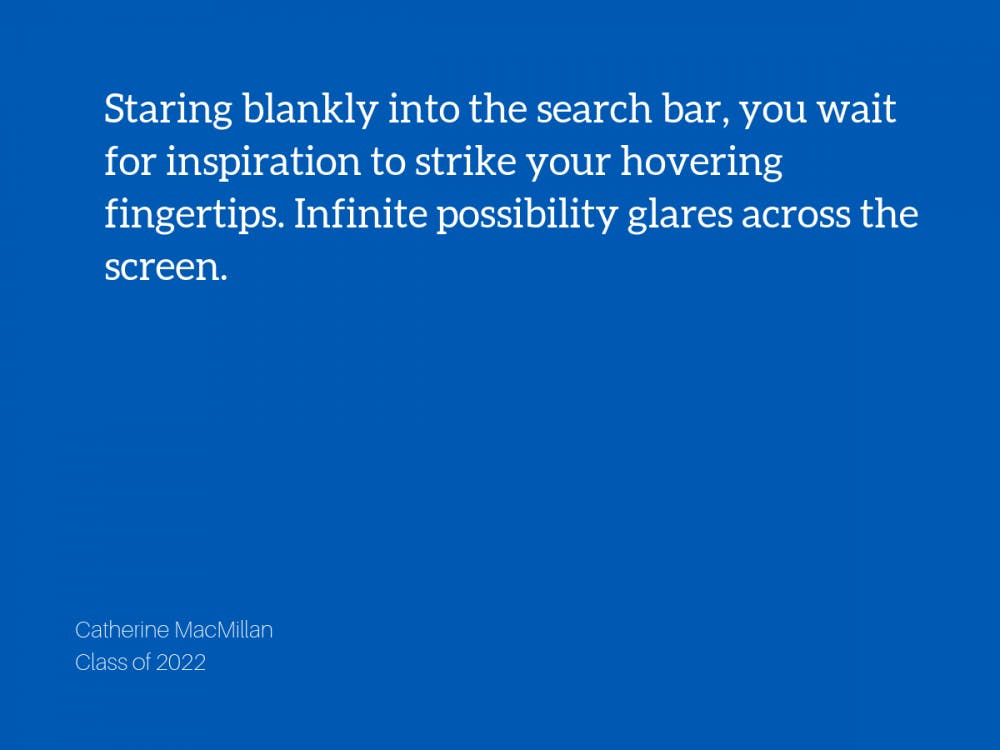Staring blankly into the search bar, you wait for inspiration to strike your hovering fingertips. Infinite possibility glares across the screen.
New tab. Insert keywords into search engine. Scroll through pages of scholars, research labs, fellowships… New tab. Copy. Paste. New tab.
An hour later, you find yourself twenty-six… now twenty-seven tabs deep into your browser. Your laptop hisses with strain, attempting to scrounge up enough bandwidth to keep up with your game of tab-volleying. Your desperate scramble to find research starts with a bust.
I’m familiar with this vicious cycle. Last fall, I was your prototypical first-year, bursting with nervous energy at the limitless array of opportunities. Seemingly within arm’s reach, I expected complete ease of access and a buffet of options to choose from. Only one of these preconceptions rang true.
Duke markets itself as both a liberal arts and premier research institution. So it’s shocking that an institution that boasts a 6:1 student-to-faculty ratio, numerous graduate programs and research partnerships at the local, state, and national level can’t amass enough visible opportunities to meet student demand. As it stands, the discovery of many mentored-research opportunities operates under primitive practices: cold-calls, door-knocking, rapid-fire emailing. Maybe you’re lucky and stumble into a professor seeking an undergraduate assistant; perhaps you get a favorable response to one of your emails. But for many, this likelihood is a gamble at best.
Coupled with the precarity and happenstance nature of finding opportunities, the infrastructure of discovery seems to prioritize a very narrow idea of research, largely STEM fields. And even then, there’s an overwhelming amount of entry points: DukeList, the Social Science Research Institute (SSRI), Muser, the Duke Undergraduate Research Support Office (DURS), summer fellowships, Bass Connections—the list goes on.
Sprawling in reach, the pathways to research involvement aren’t always intuitive. While there’s a certain whimsy about unexpectedly bumping into opportunities, it’s not a reliable method for those whose interest in research is both unequivocal and inevitable.
So just how many students actually conduct research? According to Duke’s calculations, roughly 53 percent of students graduate with research experience, which seems to be a fair enough statistic to throw out to clusters of prospective students; but something doesn’t quite add up. I wonder how the sample was collected. Were the answers self-reported? And if that’s the case, then how is research defined by the institution and students, respectively?
Research is deeply embedded in the curriculum. And so, following this logic, everyone has participated in research at Duke, not 53 percent of the undergraduate body, but 100 percent. Under the Trinity Arts & Sciences graduation requirements, the Modes of Inquiry serve to foster engagement in “intellectual themes” that help prepare students for life beyond Duke. Among these is research, coded as “R.” Understandably, an itemized list of “R” tags on your transcript doesn’t have the same effect as participation in competitive, high-impact lab research.
This illuminates a bigger problem. Research is ubiquitous at a place like Duke. It seeps into faculty conversations and nudges its way into casual asides between students. It’s stamped at the top of resumes. But while it’s tossed around flippantly, research doesn’t have a clear definition.
Some of the assumptive imagery that immediately comes to mind is hordes of lab-coat clad students, nervously pipetting fluids or analyzing petri dishes. Of course, this generalization does not reflect the true breadth, variety, and flavor of research conducted at Duke right here, right now. But these labels highlight how common perceptions shape how people narrowly define research.
Research knows no bounds; it is the process and product of itself. The act of defining would, in effect, fabricate an intellectual ceiling on what is and what could be. Still, it’s not the etymology of the word itself that should be scrutinized but the cultural norms that make research and an excitement for discovery possible.
The amount of knowledge production happening at Duke is truly unprecedented. And Duke, in the business of commercializing discovery and fostering cross-institutional partnerships, depends on a vibrant culture of inquiry. While researchers themselves have a share in the responsibility to cultivate this richness, students are also important stakeholders in the equation. Transparency and intuitive publicizing of opportunities can help preserve the unbridled intellectual potential of the undergraduate student body. Because if we are to maximize our institution’s potential, it is incumbent upon the university culture to welcome student researchers of all backgrounds, interests, and aspirations.
Catherine McMillan is a Trinity sophomore. Her column, “the devil’s archive,” runs on alternate Fridays.
Get The Chronicle straight to your inbox
Sign up for our weekly newsletter. Cancel at any time.

